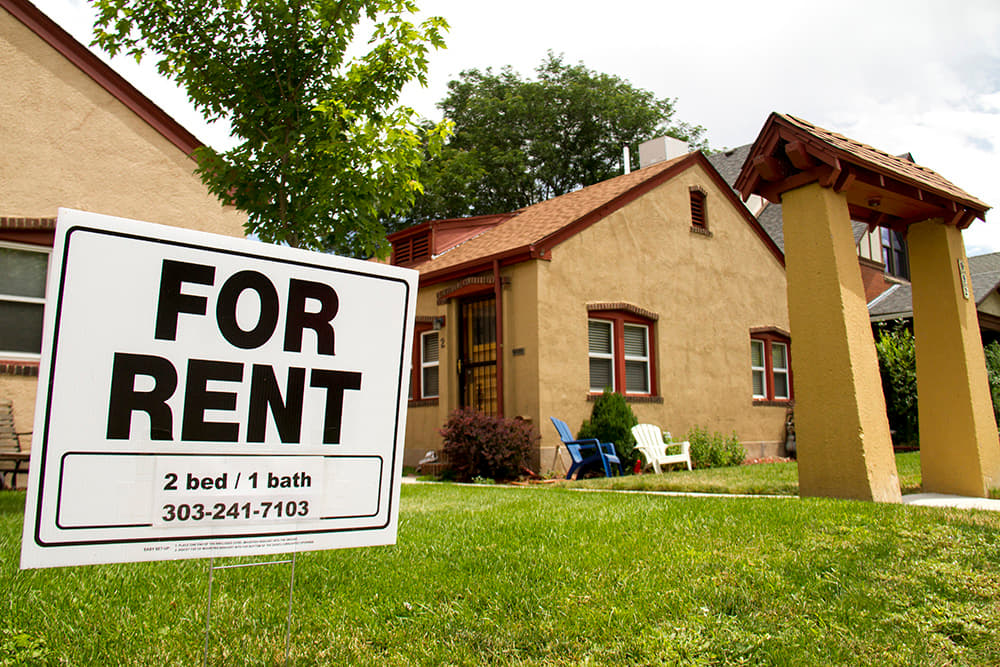Maria Orr brings home $2,000 a month after taxes and used to pay $900 a month for a studio apartment she shared with her young daughter. When her rent was increased to $1,200 a month, she just couldn't make it work.
Now she's renting one room in a two-bedroom apartment she shares with friends, making the household three adults, four children and one bathroom. Orr earns too much to qualify for housing assistance, child care assistance or food stamps.
These are the circumstances of thousands of people in Denver's booming economy and the reason renters and community activists plan to march on the state capitol Thursday evening to call for rent control and other tenant protections as part of a National Renters Day of Action for Dignity and Respect.
Update:
Last year, the website Landlord Station ranked Colorado the third friendliest state for landlords in the country and recommended that investors look to Colorado for its lack of tenant protections and the ease with which people can be evicted. The working women's advocacy group 9to5 Colorado released a report Thursday summarizing the most pressing challenges they found in a year-long survey of 961 renters in the Denver metro area.
These are some of the protections that renters in Denver lack:
- Renters on a month-to-month lease might get as little as seven days notice for a rent increase. A separate survey of residents of Globeville, Elyria and Swansea found that two-thirds of the respondents in this rapidly gentrifying neighborhood are either month-to-month or have no lease at all.
- Renters who are delinquent get three days notice to pay their back rent and can be evicted within 48 hours after that. Community activists found cases where people were evicted over as little as $8.
- There's no cap on application fees, and there is no limit on the number of applications a landlord can accept. One woman paid more than $1,000 in application fees over a three month period as she searched for housing. One landlord charged $145 per person as an application fee. Many states limit the cost of application fees to the cost of the background check.
- Landlords can discriminate based on source of income. Some respondents said they were rejected from apartments because they get child support or public assistance.
- There's no limit on how far back landlords can go in background checks. They can use an arrest with no conviction from two decades ago to deny someone an apartment.
Andrea Chiriboga-Flor, an organizer with 9to5 Colorado, said the lack of protections means it's very easy for landlords who just want more money to kick people out, and once someone loses housing, it's extremely hard to get back in.
"By the time people get into housing, they are out hundreds and hundreds of dollars," she said.
9to5 Colorado documented 35,000 evictions in 2014 in the five-county area. Evictions stay on your record for seven years, like bankruptcies and foreclosures.
"If you think about having to clean up, pack up, find new housing in a week, I don't think I could do it, and when you think about families with children or people with disabilities, it is nearly impossible and in my opinion contributes significantly to the rise of homelessness," said Jack Regenbogen, a policy associate with the Colorado Center on Law and Policy.
Most states require 30 days. Some states require 60 days. A bill that would have required 28 days notice didn't pass the state Senate this year.
Colorado state law prohibits rent control and the broad way the statute is written means policies like requiring that a certain percentage of new housing be affordable are also illegal if the new housing is rental.
But the courts have said the legislature could change this, and activists want to start lobbying now.
"I am looking across to the Capitol," said Felicia Griffin, executive director of FRESC, an advocacy group that works with low-income communities, as she stood on the steps of the City and County Building Thursday morning. "We had an opportunity last (session) to stop some of the bleeding and because of partisan politics we didn't."
They also challenged the city to keep these households in mind as they implement new affordable housing policies. The City Council just adopted new taxes and fees to support a $15 million-a-year affordable housing fund. Using local funds gives the city the flexibility to help households that earn up to 120 percent of area median income or $95,880 for a family of four, while federal funds are usually limited to 60 percent of AMI or below, which is $47,940 for a family of four.
Activists said they are concerned too much money will go to people who are comparatively well off while the poorest have to leave the city or even the region.
"We want housing that benefits the most vulnerable," said Yolanda Begay, a 9to5 Colorado board member whose own experience with eviction is described in the report. She was denied access to transitional housing because of her eviction, she said, and had to couch surf between the houses of friends and family with her young son.
Krystin Stevenson said she spent two and a half years on a wait list to get back into one of the affordable housing units that was built when South Lincoln Homes in the La Alma/Lincoln Park neighborhood was redeveloped. In the turmoil of those years, she lost precious possessions like the artwork her daughter did on the first day of school. Back in affordable housing, she recently had to quit her job to stay under the income limit and not become homeless again. And without a job, she can't save money to get into market-rate housing.
Activists said cities as well as the state have an obligation to take on the challenges its residents are facing as a result of the region's booming economy.
"Who are you building for, Denver?" Chiriboga-Flor asked. "Who are you building for, Aurora? Who are you building for, Commerce City? Who are you building for, Westminster?"
Assistant Editor Erica Meltzer can be reached via email at [email protected] or twitter.com/meltzere.
Subscribe to Denverite’s newsletter here.













